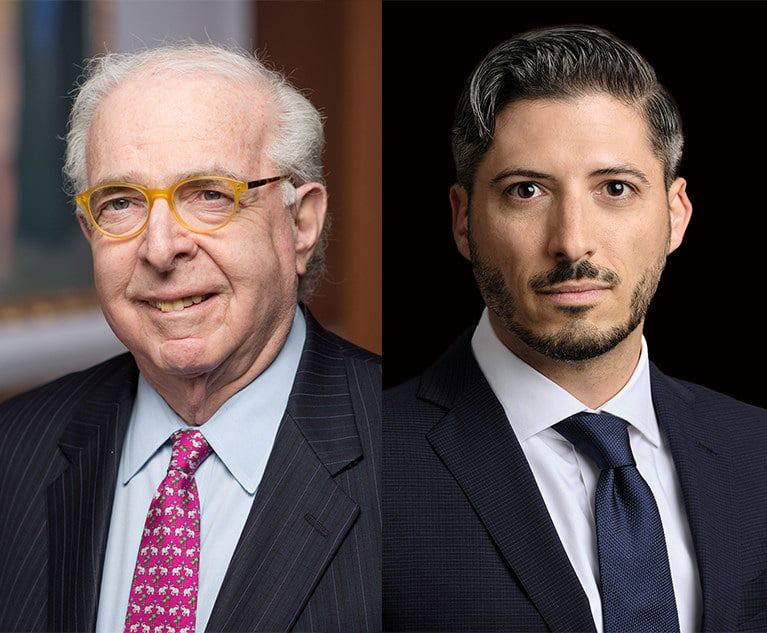 Credit: fizkes/Shutterstock.com
Credit: fizkes/Shutterstock.com The Mediation Opening Statement: Why You Should Make It and How To Make It Work
The opening statement is an opportunity to go beyond pure legal arguments and the typical all-or-nothing approach of litigation.
November 19, 2021 at 02:00 PM
5 minute read
It is not uncommon for attorneys to waive their opening statements at mediation. Sitting across the table and telling the other side why they are wrong and you are right can be difficult face-to-face. Sometimes the case has already been litigated at great length and spending time on opening statements seems a waste of precious time. The opening statement, however, is an opportunity to go beyond pure legal arguments and the typical all-or-nothing approach of litigation. In litigation you strive to prove your point and negate your opposition's position. But in mediation you must recognize your opposition's position and persuade them to agree to a resolution that meets everyone's needs. With this more collaborative approach in mind, an opening statement is an excellent opportunity that should not be waived, except in the rarest of cases.
An opening statement provides a unique opportunity to speak directly to the other party without the filter of their attorney or the mediator. Such direct communication can often produce better results. Even if the litigation is in its later stages and you have already set forth your position in motion papers or otherwise, don't assume the other party has all that information. Everything the other side knows about the case is through opposing counsel and may be skewed by the attorney's shared perceptions and guidance regarding the case. Further, relying solely on the mediator to relay your position to your adversary can ultimately take more time and increases the risk of a miscommunication. The opening statement may be the one time you can speak directly to the other party without such filter or risk.
This content has been archived. It is available through our partners, LexisNexis® and Bloomberg Law.
To view this content, please continue to their sites.
Not a Lexis Subscriber?
Subscribe Now
Not a Bloomberg Law Subscriber?
Subscribe Now
NOT FOR REPRINT
© 2025 ALM Global, LLC, All Rights Reserved. Request academic re-use from www.copyright.com. All other uses, submit a request to [email protected]. For more information visit Asset & Logo Licensing.
You Might Like
View All
Art of the Settlement: Trump Attorney Reveals Strategy in ABC Lawsuit

Evolving Legal Standards to Combat Disqualification of Arbitrators for Failing to Disclose Conflicts of Interest
8 minute read
Court of Appeals Holds that Arbitration Agreements Can Be Formed Through ‘Clickwrap’ Process
8 minute read
Law Firms Mentioned
Trending Stories
- 1Government Attorneys Face Reassignment, Rescinded Job Offers in First Days of Trump Administration
- 2Disney Legal Chief Sees Pay Surge 36%
- 3Legaltech Rundown: Consilio Launches Legal Privilege Review Tool, Luminance Opens North American Offices, and More
- 4Buchalter Hires Longtime Sheppard Mullin Real Estate Partner as Practice Chair
- 5A.I. Depositions: Court Reporters Are Watching Texas Case
Who Got The Work
J. Brugh Lower of Gibbons has entered an appearance for industrial equipment supplier Devco Corporation in a pending trademark infringement lawsuit. The suit, accusing the defendant of selling knock-off Graco products, was filed Dec. 18 in New Jersey District Court by Rivkin Radler on behalf of Graco Inc. and Graco Minnesota. The case, assigned to U.S. District Judge Zahid N. Quraishi, is 3:24-cv-11294, Graco Inc. et al v. Devco Corporation.
Who Got The Work
Rebecca Maller-Stein and Kent A. Yalowitz of Arnold & Porter Kaye Scholer have entered their appearances for Hanaco Venture Capital and its executives, Lior Prosor and David Frankel, in a pending securities lawsuit. The action, filed on Dec. 24 in New York Southern District Court by Zell, Aron & Co. on behalf of Goldeneye Advisors, accuses the defendants of negligently and fraudulently managing the plaintiff's $1 million investment. The case, assigned to U.S. District Judge Vernon S. Broderick, is 1:24-cv-09918, Goldeneye Advisors, LLC v. Hanaco Venture Capital, Ltd. et al.
Who Got The Work
Attorneys from A&O Shearman has stepped in as defense counsel for Toronto-Dominion Bank and other defendants in a pending securities class action. The suit, filed Dec. 11 in New York Southern District Court by Bleichmar Fonti & Auld, accuses the defendants of concealing the bank's 'pervasive' deficiencies in regards to its compliance with the Bank Secrecy Act and the quality of its anti-money laundering controls. The case, assigned to U.S. District Judge Arun Subramanian, is 1:24-cv-09445, Gonzalez v. The Toronto-Dominion Bank et al.
Who Got The Work
Crown Castle International, a Pennsylvania company providing shared communications infrastructure, has turned to Luke D. Wolf of Gordon Rees Scully Mansukhani to fend off a pending breach-of-contract lawsuit. The court action, filed Nov. 25 in Michigan Eastern District Court by Hooper Hathaway PC on behalf of The Town Residences LLC, accuses Crown Castle of failing to transfer approximately $30,000 in utility payments from T-Mobile in breach of a roof-top lease and assignment agreement. The case, assigned to U.S. District Judge Susan K. Declercq, is 2:24-cv-13131, The Town Residences LLC v. T-Mobile US, Inc. et al.
Who Got The Work
Wilfred P. Coronato and Daniel M. Schwartz of McCarter & English have stepped in as defense counsel to Electrolux Home Products Inc. in a pending product liability lawsuit. The court action, filed Nov. 26 in New York Eastern District Court by Poulos Lopiccolo PC and Nagel Rice LLP on behalf of David Stern, alleges that the defendant's refrigerators’ drawers and shelving repeatedly break and fall apart within months after purchase. The case, assigned to U.S. District Judge Joan M. Azrack, is 2:24-cv-08204, Stern v. Electrolux Home Products, Inc.
Featured Firms
Law Offices of Gary Martin Hays & Associates, P.C.
(470) 294-1674
Law Offices of Mark E. Salomone
(857) 444-6468
Smith & Hassler
(713) 739-1250






